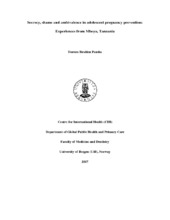| dc.description.abstract | Introduction In Tanzania, deliveries among adolescent girls have increased from 23% in 2010 to 27% in 2016. The unmet need for family planning among sexually active unmarried adolescent girls is estimated to be over 40%. In 2008, about one-third of incomplete abortion cases in health facilities occurred among adolescents and there has been an increasing documentation of unsafe clandestine abortions in the country. Despite these challenges, performing or assisting abortion is still illegal in the country, with imprisonment term ranging from 3-14 years depending on the level of involvement in the abortion procedure. Nevertheless, post-abortion care (PAC) services are provided for women with incomplete abortion complications. This research aims to contribute to the prioritized family planning agenda by exploring and adding up context-specific knowledge on out-of-school adolescent girls’ understandings, access to and experiences of modern contraception and pregnancy termination in Mbeya region, in the southern highlands of Tanzania. Methodology This is a qualitative study drawing upon phenomenological thinking in understanding out-of-school adolescent fertility control practices. Data were collected through 26 in-depth interviews and 2 focus group discussions with nurses and out-of-school adolescent girls. Data was analysed through thematic content analysis by using ATLAS ti. qualitative data analysis software. iv Findings The findings reflect ambivalence in adolescent use of modern contraception resulting from uncertainties regarding reproductive health safety. The use of modern contraceptives by adolescents is perceived by nurses and some girls as a sign of declining sexual morality thus, influencing adolescent women to resort to secretive sexual and fertility control practices in order to maintain social expectations of being moral girls. Further, nurses act as medical and moral agents during contraceptive counseling thereby informally re-enforcing social norms on abstinence and a focus on school while at the same time negotiating for appropriate contraception. Poor awareness of emergency contraceptive pills was observed among adolescent girls, including poor knowledge of fertile days within the menstrual cycle. Conclusion Although modern contraception implies sexual pleasure without fear of unplanned pregnancy, it is perceived by both nurses and girls as a reproductive health risk (infertility) and a sign for declining sexual morality. Therefore, interventions that aim to increase the use of contraceptives among adolescents need to consider how they collide with local norms and perspectives regarding sexual morality thus, directing efforts on how to change such conceptions to align with the aim of promoting adolescent reproductive health. Further, educational interventions on contraception have to increase awareness of emergency contraceptive pills among adolescent girls as well as address the need for nurses to provide emergency contraceptive information to all adolescents during family planning counseling. | en_US |
